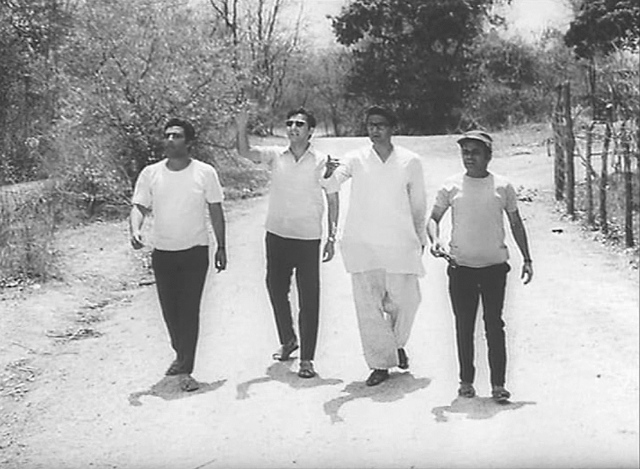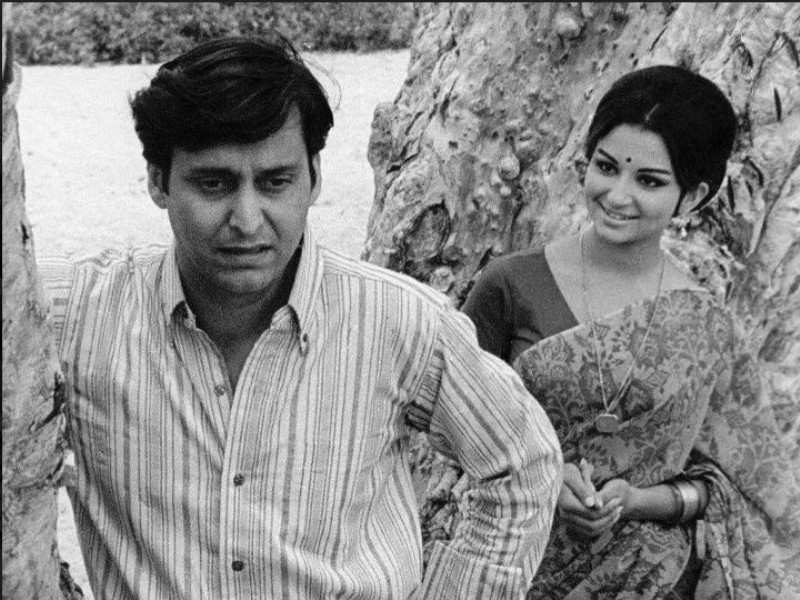When the news of Soumitra Chatterjee death broke, I tried distracting myself from the aftermath of all the obituaries reminiscing the glory days of Bangla Cinema and what Soumitra meant for the viewers from that generation to the next. But I failed when this twitter thread popped in my timeline. And it suddenly occurred to me, that I have not watched Aranyer Din Ratri despite meaning to, for years now.
 |
| A still from Aranyer Din Ratri |
4 friends finding time out of their busy urban life for a vacation in the forest made me think of ZNMD. In fact early in the film, there is a scene where Hari(Samit Bhanja) yanks a book Shekhar(Rabi Ghosh) is trying to read, out of the moving car.
To think, how the idea and locale for vacations for middle class Indians has changed so much over the course of 50 years. Though an innate drive of breaking the dull monotonous rules and routine, gives our protagonists a sense of adventure (a little reference to Ranbir Kapoor's character in Tamasha(2015))
From intimidating and bribing the caretaker of a Government Bungalow, to using the local villagers as servants - we see our protagonists from the cities visiting the countryside in a manner reminiscent of the colonists treating the natives. They are amused to learn how tribal Santhal women dress and drink, even better than their urban sisters. From the very beginning, it is clear the film will showcase the unfamiliar rural and forest life of the inhabitants through the gaze of urban middle class, mostly working, Bengali men.
 |
| before the Memory Game at the forest picnic |
In this film, there are many layers to unpack, and what I like most, is how rich this film is with information not just about those depicted but so much more about thought processes about those who made it.
The Premise
The forest is dense in parts, rich in resource and culture of those who view it as their source for sustenance. The characters in the movie and the crew, are outsiders and passerby. The characters are here to let some steam off and the crew, by virtue of what they capture, are commentators. They envy the carefree existence that they cannot afford in the city, they see no perils that is part of living close to the forest. There is a certain idyllic romance associated with a rural lifestyle, that does not follow the clock or care about the newspapers. The characters in their sojourn, try very hard to slip into this mould, without success. Soon we see them seeking the familiar, asking around, looking for people of their background till they find the Tripathis.
The Characters
Asim(Soumitra Chatterjee) in the driver's seat, is leading his friends. He used to work 16 hours a day in order to reach where is has. Rich and meditative, with a sensitive ego. He admits he does not fully understand the woman he is attracted to, and did not think much of the caretaker's ailing wife, a man whose job he risked by bribing. Rini(Sharmila Tagore) speculates that perhaps he has not experienced suffering in order to understand those have and are still suffering around him. By himself, Asim must live up to become the person he is wants others to see him as. He is embarrassed when his carefree self is discovered over a series of events by the very people he is trying to impress. He believes, he must pay for the shopping Rini does, lend money to his friend for gambling, bribe villagers. It appears he feels secure by paying for the trip and the excesses of his friends. He is intrigued by Rini because he struggles to understand her, much like his own ascending career curve.
Sanjoy(Subhendu Chatterjee) likes reading. When drunk, contemplates about his work life situation and familial responsibilities. He appears to have accepted his fate, on the road he is destined to walk in order to provide for his family. On discovering he is being propositioned by Mrs Tripathi, his character enters a state of shock. What he believes and chooses to see, is the social stigma of entering into a relationship with a widow.
Hari(Samit Bhanja) is recovering from a break up. In a bid to escape from the familiar, he is attracted to the tribal women drinking to numb their life experiences. Hari is portrayed as careless and bullying. He reacts violently to Shekhar's tongue in cheek humour and manhandles Lakha, the village guide, after accusing him of stealing his wallet which he had accidentally misplaced. When the wallet is discovered by the women he was playing badminton with, his friends insist he should thank them for their gesture but no one in the group reminds him to apologize to Lakha for ill treating him earlier, under false charges. Hari makes love to Duli(Simi Garewal), luring her with money and flirting with her about the rich excesses of city life is a dull reminder of Pocahontas.
 |
| close up shot of Hari and Duli |
Shekar(Rabi Ghosh) is the glue that keeps group together. Being the only unemployed in the group, nothing about his surroundings has had any effect on his spirits. Confident in his skin, he struts around having no stake in any of different plays at work. Some of his friends find him annoying at times but his presence is the very recreation they sought in the vacation. Shekar has some of the most memorable moments in the film.
Rini(Sharmila Tagore) is an enigma. She is calm and observant. She sees through different shades of Asim, fully aware that her knowledge of Asim's weaknesses, is hurting his ego. She is careful to make allowances, giving away easy victories in order to draw Asim closer. Her motivations though coy at times, remain unclear. She urges Asim to think about the lives he has touch by his presence in the forest, before taking his gaze towards a herd of running deers as a distraction.
 |
| Rini's remarks about the Santhal Twist fills Asim with self pity |
Asim remarks how there is so much to Rini that he doesn't fully understand. As much as she reminds him of the city girls he was used to, there exists a certain mystery about her conduct around him.
Jaya(Kaberi Bose) who appears warm and friendly, clearly craves company. She is intrigued by the strangers in the Forest, and is mindful of her overtures at first. She cooks, plays badminton and cleverly masks her grief. There is so much more to her than meets the eye. Her character illustrates how women are expected to express their desires with kind gestures and never too directly else their character will be questioned by men, who idealize a certain version of a good woman.
In the film, her presence looms large like a specter, invisible in her actions till the very end where she had carefully remembered to cook eggs for the men leaving for the city.
Dulli(Simi Garewal) is the elephant in the room. In its time, the casting decision was hailed as visionary. The decision to cast a city belle as a tribal Santhal women, but surely no one is screaming Zwarte Piet today. Tribal portrayal by outsiders is huge topic, but the idea to showcase them as caricatures is deeply disturbing.
Simi Garewal looks surreal in her character, appearing drunk and desirable in parts. Her story of widowhood are minor details in the grander picture of what her lovers find in her. In her paid comfort, she is just a service they need. Filling her whims of city life with empty promises, they try buying her dreams as well as her time.
Then there is Lakha, a relatively minor role whose character development is immense. Lakha, a villager who lives by the edge of the forest, is picked up by the group when they arrive to serve as a guide. He is happy to service the tourists, fulfilling their needs while they make themselves comfortable, till he is accused of stealing and beaten without cause. He leaves the group bitter and disillusioned only to return to commit the crime he was accused committing before. There is a lot influencing his understanding of the outsiders and he probably owes them his character arc leading to the violence he commits.
Finally
There are many layers and stories that Aranyer Din Ratri reveals and masterfully hides. The Forest in contrast to the City, life governed by rules even in a forest, where there is nobody to enforce them and the thrill of breaking the very routine that defines 'success' in the city.

Comments
Post a Comment
Comments will be held for moderation. If your comment does not appear immediately, do not repost. I reserve the right to remove any inappropriate or off-topic comments.